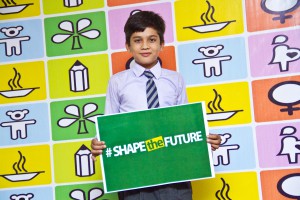23rd September 2014 Islamabad, Pakistan
Shaping the future: What matters to young Pakistanis
Ayesha* is nine years old, Ali* is eight. They live at the SOS Village in Rawalpindi, Islamabad’s Twin (although, in reality, much bigger) neighbouring City. They are two of around 100 young boys and girls who, for whatever reason, have no one to look after them at home and who are now cared for by the SOS volunteers. Here, they live in new families, receive an education – and hope for the future.
Sitting among 40 or so of the students in the school’s auditorium last week, I looked forward to hearing the ideas they had come up with for the competition the British High Commission was about to launch. “Shape the Future” is a painting and creative writing competition which invites young people from across Pakistan to express their vision for the future of their country and suggest actions which would make the biggest difference to people’s lives. Earlier this year, the Department for International Development (DFID) ran a similar competition for schools in the UK and recently announced the winners.
Our competition was launched to coincide with the start of discussions at the UN General Assembly this week on a new, universal set of development goals to succeed the Millennium Development Goals (MDGs) beyond 2015. Agreed 14 years ago, the MDGs galvanised worldwide efforts to tackle extreme poverty. They set out ambitious aims to:
- eradicate extreme poverty and hunger;
- achieve universal primary education;
- promote gender equality and empower women;
- reduce child mortality;
- improve maternal health;
- combat HIV / AIDS, malaria and other diseases;
- ensure environmental sustainability and
- develop a global partnership for development.
Pakistan continues to face many of these challenges and DFID leads the UK’s work to support Pakistan in tackling them. By 2015, UK aid will help benefit 4 million children in education, help 1.23 million poor people (more than half of them women) access microfinance loans and help prevent 1.5 million children and pregnant women from becoming undernourished.
But there is still more to be done. And at the SOS school, the students had clear views on what the priorities should be. Perhaps unsurprisingly, education was a recurrent theme. In a country where 12 million children are still not in school and half the population cannot read or write, education is a privilege rather than a right, with parents often facing the heart-breaking decision of how many of their children they can send to school. Linked to this, others flagged ending child labour as an important priority: one painting contrasted a sad child picking up rubbish for recycling, with a happy child on his way to school.
The environment was also raised as a priority. “Stop pollution!” was a recurring plea, along with calls to conserve the natural environment. Pakistan is a country of diverse landscapes and stunning natural beauty. But its tourism industry has been badly damaged by instability. Many Pakistanis are troubled by how they think their country is perceived overseas. They tell us that they don’t want to be associated with terrorism and conflict; they want to be known for security and stability. This was echoed by some of the students at SOS: an aspiration for peace and an end to conflict, the very basis for the successful development of any country, was at the forefront of many of their minds.
Many of these recommendations are included in the current MDGs, and UN Secretary General Ban Ki-moon has urged World Leaders to focus efforts on achieving these by the 2015 target date. The international community will gather in New York this week for the 69th Session of the UN General Assembly. There, they will take forward discussions on a new set of Sustainable Development Goals to end poverty by 2030. Back in Rawalpindi, Ayesha and Ali will continue their lessons in English, Mathematics and Islamiat and hope that their priorities will also form part of the debate.
* Names have been changed.

